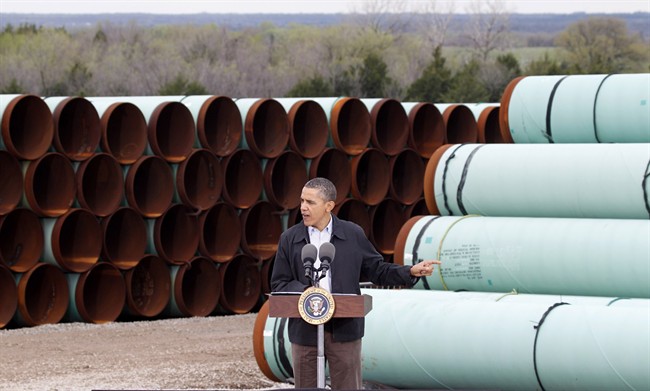WASHINGTON – The White House says it would be willing to consider a bill authorizing construction of Canada’s Keystone XL pipeline, should the new Republican-dominated U.S. Congress produce such legislation.

Republicans have made it clear they’ll try using their new power to force Barack Obama to approve the long-delayed project, through legislation for him to sign.
But whether the president would actually sign such a bill or automatically veto it remains an open question – one Obama’s spokesman left unanswered Thursday when he was asked it directly.
READ MORE: U.S. election bodes well for Sask. government, Keystone project
“We’ll consider any sort of proposals that are passed by Congress, including a rider like this,” Earnest told a White House briefing Thursday, using the term for an add-on to a bill.
The mere willingness to consider such legislation appears to fly in the face of the White House’s oft-stated position on the pipeline, repeated dozens of times at briefings over the years.
The White House has frequently pointed out that under a decade-old executive order signed by George W. Bush, the cross-border pipeline approval process does not belong to the legislative branch of government but to the executive one, with a multi-agency review led by the State Department.
The White House has often dismissed the idea of Congress passing a law to circumvent that review, something Earnest himself noted Thursday. “(It) does seem to pretty directly contradict the position that’s been adopted by this administration – but also the position that’s been taken by previous administrations as they have considered pipelines of this sort.”
WATCH: Midterm elections in the U.S. saw Republicans take over the senate. Laurel Gregory has more on what it means for Alberta’s most prized resource.
Now that Republicans control both chambers of Congress and can advance legislation, the question is which bills Obama will sign and which he will veto.
The president almost described the new political reality as a Venn diagram at a press conference Wednesday. On one side Republicans will pass bills which, Obama said, he’ll sometimes find unacceptable and veto. On the other hand, he said he’ll take executive actions they don’t always approve of.
In the middle, they might find common ground on a few issues. “That’s natural,” he said. “That’s how our democracy works.”
Friendly terrain for such agreement could include tax reform, infrastructure spending and congressional authorization for Obama to seek a new 12-country Trans-Pacific Partnership free-trade deal including Canada.
It’s unclear whether Keystone XL might fit into that space.
READ MORE: What the wide-ranging U.S. midterm results mean for Canada
Obama didn’t say much when asked about the pipeline Wednesday. He simply reiterated his familiar line that the project is undergoing a regulatory review, and he also mentioned an impending court decision in Nebraska over the route.
Obama seemed to play down the very importance of the debate, noting that while Americans were arguing about what to do with Canadian oil they were experiencing a surge in production of their own.
Republicans, conversely, have played up the importance of Keystone.
It’s often the first specific thing the party mentions when asked how it will use its new power in Congress. It came up again Thursday in different places – a news conference with the Republican House leader, and in an opinion piece he co-authored with the new Republican leader in the Senate.
“These bills (we want to pass) provide an obvious and potentially bipartisan starting point for the new Congress – and, for President Obama, a chance to begin the final years of his presidency by taking some steps toward a stronger economy,” the congressional leaders wrote in the Wall Street Journal on Thursday.
The first bill they mentioned: construction of the Keystone XL pipeline, which they said, “will mean lower energy costs for families and more jobs for American workers.”



Comments